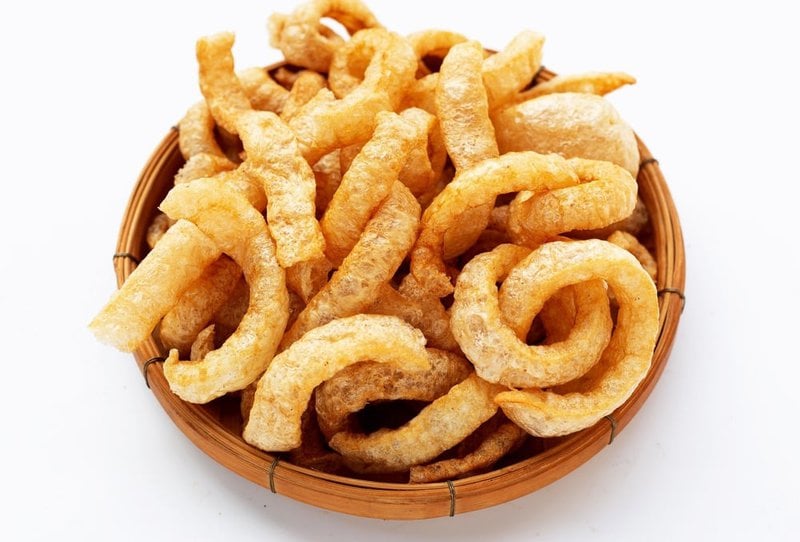Crunchy salty pork rinds are a tasty snack for many. But could these fried pig skins actually make you sick? With concerns over sodium fat, and preservatives, it’s understandable if you’re wondering “can pork rinds make me sick?” Here’s a thorough look at the health effects of eating pork rinds.
What are Pork Rinds?
Also known as pork cracklings or pork scratchings, pork rinds are made from the skin of a pig. To produce them, the pig skin is first boiled to remove excess fat. It’s then dried out until very crisp, sliced into pieces, and deep fried.
The frying causes the dried skin to bubble up into light, crispy textures that make for a satisfying snack. Pork rinds are often seasoned with salt, pepper, spices or other flavors. Popular brands like Mac’s and Rudolph Foods mass produce packaged pork rinds.
Can They Make You Sick?
When eaten occasionally, pork rinds are unlikely to make you sick. Here’s why:
-
Safe cooking temperatures – Commercial pork rinds are cooked at high temperatures up to 400°F. This kills any potential bacteria that could cause foodborne illness.
-
Low moisture – Drying and frying pork skin removes moisture needed for microbial growth The low moisture content of packaged rinds prevents spoilage
-
Preservatives – Ingredients like salt, sodium phosphates and citric acid preserve shelf life and prevent food poisoning.
-
Short ingredient lists – Most pork rinds only contain pork skin, salt and preservatives. Simple ingredients mean less risk of contamination.
So when prepared properly under sanitary conditions, pork rinds are very low risk for causing food poisoning or sickness. Their high salt and low moisture make it difficult for dangerous microbes to grow.
Potential Minor Risks
While major illness is very unlikely, there are some potential minor risks of eating pork rinds:
-
High sodium – The high salt content may increase blood pressure and dehydrate those sensitive to sodium.
-
Cholesterol – Pork contains cholesterol, which in excess can increase heart disease risk.
-
Artificial ingredients – Preservatives like MSG may cause headaches or stomach upset in sensitive individuals.
-
Fatty – The high fat content could cause temporary digestive issues like diarrhea, cramps or nausea.
-
Allergies – Those allergic to pork may experience reactions like hives, swelling or anaphylaxis.
-
Choking hazard – Eating too quickly or not chewing thoroughly raises the risk of choking on hard pieces.
For most people though, these risks are minimal. Sicknesses directly from pork rinds when consumed occasionally are very rare. Those with sodium-restricted diets or pork allergies should avoid them.
How to Enjoy Pork Rinds Safely
To enjoy pork rinds safely with minimal health risks:
-
Stick to 1-2 serving sizes and avoid overeating
-
Look for low or reduced sodium varieties
-
Choose brands without artificial additives like MSG
-
Eat slowly and chew thoroughly before swallowing
-
Drink fluids to offset sodium dehydration
-
Buy rinds from reputable brands and check expiration dates
-
Avoid rinds if you have high blood pressure or heart disease
-
Don’t eat pork rinds every day due to the high fat and sodium content
Healthier Snack Alternatives
If you want to avoid pork rinds due to health concerns, consider these crunchy snack alternatives:
-
Roasted chickpeas or edamame
-
Air-popped popcorn
-
Nut mixes with peanuts or almonds
-
Baked kale or vegetable chips
-
Rice cakes or crispbreads
-
Sliced fruits and vegetables
-
Whole grain crackers
-
Bean or nut butters with apple slices
-
Hard boiled eggs
-
Low-fat string cheese or Greek yogurt
Choosing snacks lower in fat, sodium and preservatives can help you avoid minor gastric upset or other issues pork rinds may cause.
The Bottom Line
When prepared properly and eaten in moderation, pork rinds are very unlikely to make you sick. Their high salt content and cooking methods kill bacteria that cause food poisoning. However, overdoing high sodium, fatty foods may cause temporary digestion troubles in sensitive people. Those with existing health conditions should be cautious with pork rinds. But for most, major illness from occasional pork rind snacking is rare. Sticking to healthier snacks provides more nutrition without the risks.

Can You Eat Pork Rinds On Keto? – Dr. Berg
FAQ
What are the side effects of eating pork rinds?
Can you get food poisoning from pork rinds?
Can pork rinds upset your stomach?
How can you tell if pork rinds are bad?
Are pork rinds bad for You?
Pork rinds are high in both saturated fat and cholesterol, an unhealthy combination that can raise your low-density lipoprotein (LDL) levels — the “bad” kind of cholesterol. If you eat pork rinds, here are some things to consider: Look for brands that don’t contain artificial preservatives and flavorings and that are lower in sodium.
Why is pork not recommended to eat?
This is not true, some cuts like sirloin and pork rump steak, for example, are very healthy, even healthier than beef and chicken. Only the fattest cuts like bacon and crackling should be avoided.
Are pork rinds good for You?
But Men’s Health claims that about 43 percent of pork rind fat is the oh-so-healthy oleic acid also found in olive oil. Not only is the fat better for you, but pork rinds also contain a significant amount (about 17 grams) of protein, and potato chips don’t. Now, pork rinds aren’t perfect.
Can you eat pork rinds?
If you want to include pork rinds in your diet, it’s best to eat them in moderation. Instead of snacking on them out of the bag, try using them as a crunchy, bacon-like topping on roasted vegetables or a salad. That way, you can enjoy their flavor but keep your calorie and sodium intake to a minimum.
